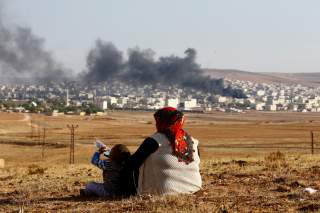Why Your Tax Dollars Can't Save Syria
By its own admission, the UN is unable or unwilling to track where its money goes in Syria. A lack of oversight has delivered nearly $4 million in medical relief to the Syrian Arab Army blood bank.
On January 10, Russia prevailed on behalf of its client, Syria's Bashar al-Assad, by forcing the United Nations to only renew two of the four cross-border aid access points into the country. On December 20, Russia had completely blocked the UN from re-approving its authority until the January vote, thus casting its fourteenth UN veto on Assad’s behalf and jeopardizing those people in Idlib who are in desperate need of assistance. While Assad pursues his nearly decade-long repression campaign, he continues to leverage every tool—even supposedly neutral UN humanitarian assistance—to consolidate his grip on power. As humanitarian assistance remains one of the last steadfast forms of U.S. engagement in Syria, it’s incumbent on U.S. leaders to ensure taxpayer dollars do what they’re intended to do, which is providing aid to Syrians in need instead of serving as another weapon in the Assad regime’s arsenal. Time to act is running short.
Assad’s early effort to withhold aid from his opponents is precisely what prompted the UN in 2014 to approve cross-border aid in the first place. As of November 2019, at least 2.7 million people still rely on UN cross-border aid because they have no alternative source of support.
But with only half of cross-border entrances approved, and even then, they’ve only been approved for six months, the United States must take the added step to ensure that its more than $6 billion in contributions to the UN’s Syria response ($435 million in 2019 alone) are being distributed on an as-needed basis and not an access-based manner.
The task is monumental: the Syrian regime has compelled the UN and international nonprofit organizations to operate out of Damascus. The Assad regime thus largely controls who enters the country, which (often regime-aligned) local organizations are chosen as partners, and how aid is distributed. A Human Rights Watch report found the Assad regime has systematized the diversion of aid and reconstruction resources to fund its atrocities, punish those perceived as opponents, and reward loyalists.
It appears that UN agencies have, de facto, traded autonomy for access under Assad’s blessing, but such a bargain has left them with little leverage to faithfully carry out their humanitarian mission for the whole country. Experts estimate that between 2 and 18 percent of UN aid actually reaches the civilians it’s meant to help—and even that rarely goes to the neediest people in opposition-held areas, where Assad often blocks aid from entering. Additionally, the UN has yet to institute necessary reforms.
Congress has taken note, and H.R. 4868, the Stop UN Support for Assad Act of 2019, will reduce the risk that U.S. taxpayer dollars will enrich Assad. This bipartisan initiative would ensure that no money directly or indirectly falls into Assad’s hands by requiring that UN programming in the region, largely funded by the United States, not materially support the Assad regime, and barring that, redirect the funds to USAID altogether. No funding would be cut; instead, it would go to the Syrians who need it most.
By its own admission, the UN is unable or unwilling to track where its money goes in Syria. A lack of oversight has delivered nearly $4 million in medical relief to the Syrian Arab Army blood bank. Likewise, the UN had to rethink where it housed its employees in Damascus in July 2019 after the United States sanctioned the Four Seasons in Damascus for its ties to the regime—the same hotel where the UN spent $9.5 million in 2016 alone.
H.R. 4868 would encourage the United Nations to create mechanisms so that it knows exactly how its dollars are being spent and is able to ensure that none of those dollars are used toward the commission of war crimes. The United States already demands this oversight to prevent inadvertent terror financing. Setting this standard will enable all organizations on the ground to adopt the same criteria around human rights. Investors and donor countries need to conduct due diligence—and if their funds support human-rights abuses, then that funding should be withheld until violations cease, agencies undergo reform, and victims receive compensation.
While sanctions have proven to be a good form of leverage against Assad and his allies—including Iran and Russia—Assad is still getting money from somewhere.
The United Nations Development Program, the World Health Organization and others must clean their own houses to ensure that they are not underwriting Assad’s war.
Amid brutal war, aid neutrality must be safeguarded, and H.R. 4868 is a long-overdue step. Alone, this one act of Congress is not enough to restore American leadership abroad, nor galvanize international action against a dictator’s abuse. One bill will not undo the slow rollback of international order. But it’s a start.
B. Lana Guggenheim (@BLanaGuggenheim) is a freelance journalist based in New York City. She has a MSc in International Conflict from the London School of Economics and Political Science. She works as a reporter and editor covering extremism, culture, economics, and democracy.
Image: Reuters

